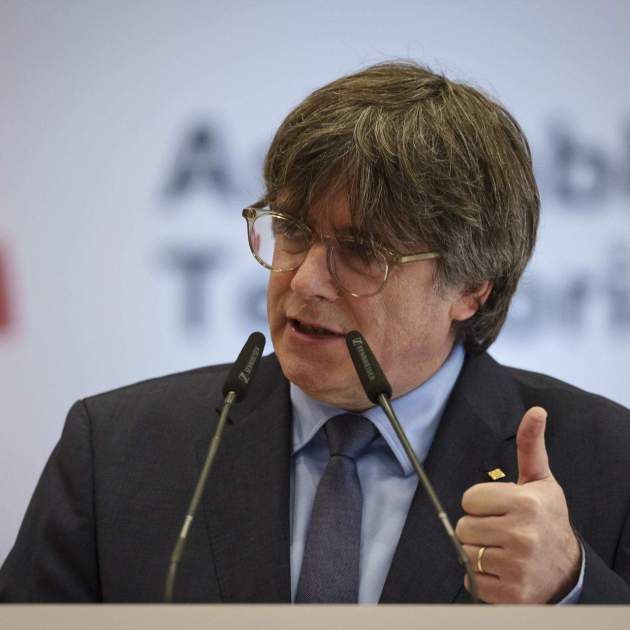Catalonia's president-in-exile, Carles Puigdemont, caused surprise this Wednesday by asserting that the electoral calendar that sends Catalan voters to the polls on May 12th would allow him to be present at the investiture session, when the newly-elected Parliament formally votes in the next Catalan president. Puigdemont's statement, which has fueled speculation over his decision - not yet announced - to be Junts' candidate in the parliamentary election, is based on the precise details of the procedural schedule for the legislation, which runs closely in parallel with the timing of the electoral process.
It is expected that the amnesty bill to end Catalan independence-related cases, which was passed by Spanish MPs this Thursday, will land in the upper house, the Senate, on Tuesday next week, to begin a hearing process that seems certain to last for the maximum two months that is possible. The absolute majority held by the opposition People's Party (PP) in the upper house has already made it clear that the text will be overturned, thus forcing it to be returned to Congress, where it will revert to the current version and then be definitively approved. This means that the last legislative formality will occur at the end of May at the latest, when it will be published in the government gazette, the BOE, and will come into force, triggering a series of immediate changes.
End of arrest warrants
From the entry into force of the text, the judicial organs that have cases linked to the process in their hands will have to apply the law preferentially and urgently, within a maximum period of two months. Previously, however, Article 4 of the amnesty text specifies that, once approved, the judicial body that is overseeing the case will immediately lift any precautionary measures and "will leave without effect the orders of search and arrest and entry into prison for the people to whom the amnesty applies" with the same applying to European and international arrest warrants.
Although the elections will be held on May 12th and Puigdemont is still expected to be subject to a Spanish search and arrest warrant during the election campaign, the situation will change from the end of May, when the law comes into force. This will be almost exactly the moment when, once results are announced, the new Parliament will be constituted.
Investiture session
The new Parliament must be constituted within 20 days following the holding of the election, which a calculation that does not include Saturdays or Sundays or the public holiday of May 20th. So it will have to happen on Monday, June 10th at the latest. But this is the first step: once the house is constituted, the new speaker will have ten days to talk to the parliamentary groups and propose a candidate for the presidency. No later than June 24th. It is in this session that the new president will be chosen, and where Puigdemont assumes that his presence will be possible, given that the amnesty law will have already been approved - at the end of May - and the arrest warrants lifted immediately.
Different voices have pointed out, however, that an appeal to the Spanish Constitutional Court against the law or a preliminary question to the European Court of Justice, would leave the law in abeyance and, therefore, also the lifting of the arrest warrants. However, this is also provided for in the legislation being processed in the Spanish houses of parliament. On the one hand, Article 10 of the text already specifies that judges have two months to apply the law "without prejudice to subsequent appeals, which will not suspend its effects". But, in addition, Article 4 of the text has incorporated an amendment which specifies that "the suspension of the criminal procedure for any reason will not prevent the lifting of the precautionary measures that had been agreed upon prior to the entry in force of this law and that entailed the deprivation of the exercise of fundamental rights and public freedoms".
The law is backed by Article 163 of the Spanish Constitution which states that if a judge presents a question of constitutionality before the Constitutional Court the effects "will under no circumstances be suspensive", and it is also supported by the Treaty on the Functioning of the EU.
Hence Puigdemont's conclusion. "That being the case, it is quite reasonable to think that I will be able to be present at the next investiture debate of the president of the Generalitat. And I would be very happy to be able to be present," he assured.
